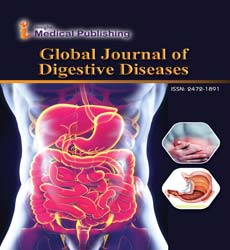Abstract
Prognostic value of Neutrophil-Lymphocyte ratio in patients with advanced pancreatic cancer
Background: Pancreatic cancer is an aggressive tumor with a poor prognosis and high rate of mortality. Recently, systemic inflammation-based prognostic markers have been established to predict the prognosis in patients with pancreatic cancer. Among those indicators, we aimed to investigate the utility of neutrophil-to-lymphocyte ratio (NLR) as prognostic factors in Tunisian advanced pancreatic cancer. Methods: A retrospective study was conducted at the department of Medical Oncology in Sfax, including 31 patients treated for a locally advanced or metastatic pancreatic cancer, from 2011 to 2017. NLR was evaluated and correlated with survival. Value cutoffs were adopted to discriminate patients as follows: low NLR < 3 and high NLR≥6. Results: A total of 31 patients were included. The median age was 60 years [range 36-77]. Sixty-one per cent were male and 29% had a performance status (PS) ≥2. The median duration to consult was 2,7 months and the main symptom for consultation was abdominal pain (87%) followed by jaundice (29%) and weight loss (26%). The median size was 45 mm. Metastases were founded in 16 patients (51,6%). Chemotherapy was indicated in 19 patients, in 38% in case of neoadjuvant situation and 51% for metastatic cases. NLR was <6 in 24 cases and ≥6 in 7 cases. The median overall survival (OS) was 7 months. The 1-year and 2-year OS was respectively 12.9% and 3.2%. NLR ≥6 was associated with lower OS (1-year OS 0% vs 16.7%, p=0.0001). Other prognosis factors were PS ≥2, high rate of CA19-9 and stage IV (p= 0.001, p=0.021, p=0.027). Conclusion: Our study concluded that in addition to the other prognosis factors, inflammation-based markers such as NLR ≥6 may be useful as prognostic factors for advanced pancreatic cancer. Biography Wala BEN KRIDIS is working at University of Sfax, Tunisia.
Author(s):
Wala BEN KRIDIS
Abstract | Full-Text | PDF
Share this

Google scholar citation report
Citations : 112
Global Journal of Digestive Diseases received 112 citations as per google scholar report
Abstracted/Indexed in
- Google Scholar
- Sherpa Romeo
- WorldCat
- Publons
- Secret Search Engine Labs
Open Access Journals
- Aquaculture & Veterinary Science
- Chemistry & Chemical Sciences
- Clinical Sciences
- Engineering
- General Science
- Genetics & Molecular Biology
- Health Care & Nursing
- Immunology & Microbiology
- Materials Science
- Mathematics & Physics
- Medical Sciences
- Neurology & Psychiatry
- Oncology & Cancer Science
- Pharmaceutical Sciences
